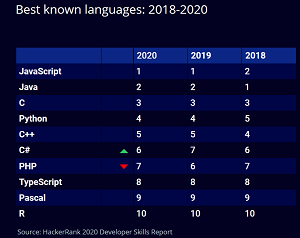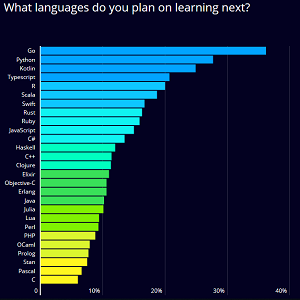News
C# Rises in Skills Report's 'Best-Known Language' Ranking
HackerRank has published its 2020 Developer Skills Report, which shows C# gaining ground in the list of "best-known" programming languages for 2020.
The company, which provides a platform that uses coding challenges to match developers with employers and claims a community of more than 7 million developers, based its third annual report on a survey of 116,648 coders from 162 countries.
In examining sections of the report of special interest to Visual Studio developers, C# was conspicuously found to be the only programming language to change positions in the "best-known" ranking, which otherwise was stagnant from 2018 to 2020. This year, C# jumped up from seventh to sixth, changing places with PHP. That was the only movement recorded.
 [Click on image for larger view.] Best-Known Languages (source: HackerRank).
[Click on image for larger view.] Best-Known Languages (source: HackerRank).
"In terms of most known languages, little has changed over the last three years," the report said. "In fact, the top 10 languages saw only two changes from last year: C# and PHP switched between sixth and seventh position.
"It's worth noting that the best known language, JavaScript, isn't a language most developers learn to code in -- only 5 percent of respondents reported it as their first programming language. Java follows a similar pattern: it's the second best known language overall, yet only 13 percent of developers say it was their first language learned."
C#, .NET Core and other Microsoft-centric technologies are also featured in the report. For example, in answering the question, "What language skills do you look for when hiring developers?" C# was chosen by nearly 20 percent of respondents, putting it in fourth place behind JavaScript, Python and Java.
When asked what languages they planned on learning next, C# was listed by 13.5 percent of respondents, placing it in 11th place, with Go leading that pack. In that category, another Microsoft creation, TypeScript, was at No. 4. C# was also pretty far down the list of "Salary increase based on languages known," a category led by Perl.
 [Click on image for larger view.] Next Language to Learn (source: HackerRank).
[Click on image for larger view.] Next Language to Learn (source: HackerRank).
All in all, C# didn't do as well in this survey as it has in others, as detailed in the article C# Shows Strong in Tech Skills Reports published last month.
In the three-year listing of best-known frameworks, .NET Core placed seventh all three years. It placed ninth on the list of frameworks that developers plan on learning next, a list dominated by JavaScript-based offerings like React, AngularJS, Vue.js and so on. It rose to sixth on the list of "Salary increase based on frameworks known," for which Backbone.js was No. 1.
Other highlights of the report include:
- For learning to code, C is overtaking BASIC.
- Gen Z is more likely than any previous generation to utilize bootcamps. Nearly one in six say they've leveraged bootcamps to learn new skills.
- Across company sizes, hiring managers agree that full-stack developers are top priority: 38 percent of hiring managers say it's the No. 1 role to fill in 2020. Back-end developers and data scientists were ranked second and third priorities, respectively.
- Full-stack developers may be in highest demand, but their role is also one of the most professionally demanding. 60 percent of full-stack developers were required to learn a completely new framework in the last year -- more than any other role polled.
- Globally, JavaScript is the most popular language hiring managers look for in a candidate. But not all hiring managers see language skills as a top priority: globally, 14 percent say they're language agnostic when screening candidates.
- For the third year running, Go is the No. 1 language developers want to learn next. Developed by Google, Go has seen increasing popularity since its invention in 2009, due in part to the visibility of its creators. As we noted in our 2018 report, it's not the first time tech giants like Google have driven language adoption: Twitter similarly boosted Scala when it outgrew Ruby on Rails, as Apple did for Swift when it moved away from Objective-C.
- Perl is the language most closely associated with above-average pay. Globally, developers that know Perl make 54 percent more than the average annual developer salary. It's followed by Scala (+42 percent ), and Go (+33 percent ).
- Averaged across all job roles and levels, U.S. developers are paid the most: developers there make $109,167.36 annually on average.
- Only 35 percent of developers believe they're being paid fairly. On the flip side, 39 percent believe they're being paid unfairly compared to peers, and 26 percent just aren't sure.
- The most important form of professional growth: new tech skills.
- 62 percent of developers in individual contributor roles want to become a technical lead in the next three years. That's a stark contrast to the number that want to become managers (15 percent ).
"The data provides unparalleled insight into what employers and employees know, what they're looking for in their work, and how they see their roles evolving as technology sweeps across industries of all sizes," HackerRank said. The report can be accessed from this post.
About the Author
David Ramel is an editor and writer at Converge 360.